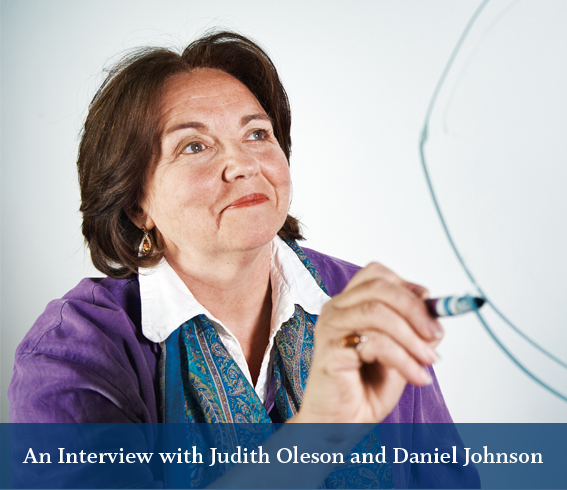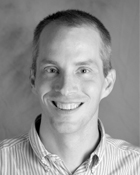STILLPOINT Archive: last updated 07/15/2013

Judith Oleson and Daniel Johnson, both associate professors in Gordon’s Sociology and Social Work Department, have at least two other things in common: a passion for the gospel work of peacebuilding, and a conviction that good scholarship has practical, real-world implications. STILLPOINT interviewed them recently about their roles in two new projects: the Initiative for the Study and Practice of Peace, and a new academic minor in peace and conflict transformation.
STILLPOINT: Why peace studies? Why now?
 |
Daniel Johnson: For starters, the Hebrew and Christian Scriptures continually enjoin the followers of God to seek peace, to make peace, to live in peace. Though there are substantial disagreements about how we should try to achieve peace in this broken world of ours, the goal itself is one that all Christians should be able to affirm. And when we do so, we find there are millions of others from other faith traditions—and even from no faith tradition—with whom we share common cause. |
Both of these off-campus contexts provide rich material for one of the social work courses I teach, Working with Groups and Organizations.
I’m also concerned about the growing interest in guns as a perceived method of reducing violence. I recently presented a paper at the Peace and Justice Studies Association National Conference that outlined methodology for creating a more meaningful dialogue between gun-rights and gun-control groups.
DJ: Unlike Judith, I received no formal training in peace studies. Indeed, I may have looked askance at such a nontraditional, eclectic field during my years of graduate study in sociology. Through the years, however, I have found I am far more motivated in my work by the hope for peace than by some kind of diffuse commitment to an academic discipline. So I find myself sharing the experience of thousands of peace researchers whose education was in some other academic discipline but whose passions led them to the study of peace.
In particular, as a cultural sociologist I focus on how the frameworks of meaning that we inhabit generally motivate or inhibit certain social actions and interactions. Where this approach hits home for many of our students is in unpacking why it is that religious identities and convictions can promote violence in so many circumstances while at the same time contributing to the cause of peace in so many others.
SP: What about the international arena?
DJ: I need to be careful how I say this because I do believe diplomacy, international treaties, peace accords and so on have a critical role to play in bringing peace to our world. Yet these kinds of headline-grabbing processes and events tend to obscure the essential work that untold numbers of peaceworkers do behind the scenes and on the ground to make possible the fragile peace celebrated in the headlines. And long after the media spotlight drifts away from places as far flung as Rwanda, the Balkan states, Cambodia and Nicaragua, those workers are still there, living and working with would-be antagonists to resolve misunderstandings and grievances in ways that preclude a return to violent engagement. One of my hopes for peace studies at Gordon is that students and other community members will be led to picture these sorts of workers whenever they think of peace efforts in the international arena. And who knows? Maybe some of them will see themselves in those pictures.
JO: It’s important for students to know that every international conflict has a local context. Women and children suffer from displacement, abuse and poverty during and after conflict. Soldiers return to communities not always equipped to meet
their post-trauma needs. The rebuilding of neighborhoods after generations of ethnic and religious conflict is at the heart of reconciliation.
During my doctorate studies I was able to visit reconciliation processes in South Africa, Israel and Palestine, and Egypt, specifically examining strategies in religious and identity-based conflicts and community reconstruction. After an internship with the United Nations Development Business Partnership Office at U.N. Headquarters in New York, I was sent to Kazakhstan to mediate failed partnerships between the U.N. and multinational corporations in Central Asia. I also became active with Initiatives for Change, a faith-based organization that sustains an informal worldwide network of those engaged in reconciliation. I have been a presenter at their reconciliation conference in Caux, Switzerland, for several years.
During my recent sabbatical I worked with Rabbi Hillel Levine, founder, and Anuradha Desai, executive director of the International Center for Conciliation. ICFC trains diverse religious communities in a process of exchanging historical narratives to increase understanding and rebuild community following violent conflict. My contributions included designing a training strategy, rewriting proposals for their work in Israel and Palestine, modifying their fellowship program and facilitating an organizational planning retreat.
SP: In what ways is Gordon well-positioned to the task of “teaching peace”?
JO: Gordon, due to its strong liberal arts tradition that integrates faith with learning, is in a unique position to be “teaching peace” through a theological lens. We’re equipped to help students examine and respond to conflict on personal, social and global levels, and to provide the space for self-reflection that is key to global leadership.
The College already serves as a leader in intra-faith dialogue, and we’re well-positioned, through our faculty, to provide diverse Christian perspectives on peacemaking. The many scholars and professionals in the Boston area in the mediation field will provide key opportunities for student internships.
DJ: I believe Gordon is uniquely positioned to offer a more comprehensive approach to the subject of peace and conflict and reach more diverse audiences than other programs in Christian institutions. Not surprisingly, most of the standing peace programs across the landscape of Christian higher education are in schools tied to the Anabaptist tradition. Yet we find intellectual and moral resources to engage with such matters scattered all across the many Christian traditions. Moreover, while most programs focus on political processes of conflict resolution, we know these questions are not solely political. They also demand careful attention to social divisions (religious, cultural, racial, ethnic and gendered), economic relations, ecological concerns and so on. Gordon offers an ideal setting in which to bring the full range of Christian reflection to bear on the full range of questions associated with the quest for peace.
Daniel Johnson, Ph.D., is associate professor of sociology, department chair, and a recipient of Gordon’s annual Distinguished Junior Faculty Award. In addition to his regular teaching responsibilities, he coordinates and teaches Gordon’s Coffee Seminar, which examines the structure of the global coffee trade and its impact on local communities in Guatemala.
[email protected]
Judith Oleson, M.S.W., M.P.A., D.Min., is associate professor of social work, teaching Groups and Organizations, Field Practicum Seminars, and directing senior field practicums. Next spring she will teach the first course in the new minor, Peacemaking: Personal, Social, Global. She is cofounder of Oleson/Sarrouf Associates.
[email protected]
Initiative for the Study and Practice of Peace Launches
Several components are set to begin by the fall of 2010:
To participate or contribute, contact Daniel Johnson or Dan Tymann.
New Minor in Peace and Conflict Transformation
Hosted by the Sociology and Social Work Department, a new, recently approved minor in peace and conflict transformation will be an asset to many majors, providing students with core knowledge and skills to apply in any setting. Though the minor will draw on the teaching and scholarly interests of the Sociology and Social Work Department, other departments with scholarship and expertise in the field will be participating as well.
NEXT: Perspectives On the Teaching of Peace